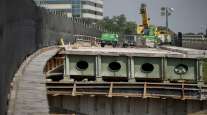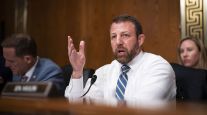Senior Reporter
Freight Stakeholders Press Congress for Results
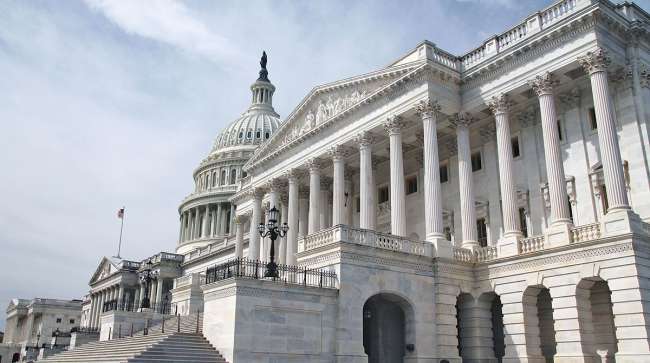
[Stay on top of transportation news: Get TTNews in your inbox.]
WASHINGTON — With the 118th session of Congress underway, freight stakeholders are calling on lawmakers to prioritize proposals targeting supply chain connectivity and long-standing concerns associated with the trucking workforce.
Groups representing the trucking industry, commercial drivers and transportation agencies point to the potential for advancing key issues over the next two years.
The industry is focusing on metrics and goals under the purview of congressional transportation committees, including potential proposals related to fuel emissions, employee labor models, highway safety and access to parking, American Trucking Associations Executive Vice President for Advocacy Bill Sullivan said Jan. 11
In focusing on a dossier of “doable” policies, Sullivan said, “How can we balance the goals of reducing emissions, reducing fuel use and still manage the supply chain that has the capacity to safely, securely and at a reasonable cost deliver goods to all the communities and businesses and homes that need freight?”

Sullivan
A key element of safety for truckers is finding a secure place to park for rest breaks, he said. Insufficient parking has been a long-standing concern for firms operating in metropolitan hubs, and commercial truck drivers often have shared anecdotes about the challenges associated with parking.
Stakeholders such as ATA have for years also sounded the alarm about the issue, and Sullivan said that will continue in the new Congress.
“I am sure that we are going to tell a loud and proud story on truck parking,” he said.
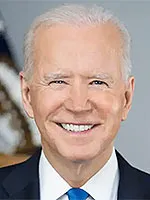
Biden
During the most recent congressional session, transportation leaders sought unsuccessfully to advance to President Joe Biden’s desk more funding for truck parking projects. Sullivan expressed confidence about arriving at resolutions with members of this Congress.
“I’m optimistic because what we’re not doing is fighting a partisan fight,” he said. “We understand that this system is one in which people have to compromise and reach consensus.”
For Todd Spencer, president of the Owner-Operator Independent Drivers Association, industry regulations linked to workforce behaviors and performance are front and center for his group.
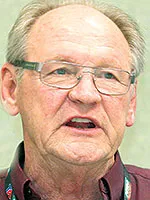
Spencer
“We consistently hear about the need to simply have access to the restroom, the lack of guaranteed overtime pay for truckers and the threat of mandatory speed limiters. These are issues that make the trucking profession less desirable and contribute to pathetic rates of driver retention,” Spencer said in a statement provided to Transport Topics. “We look forward to working with our allies in Congress to keep experienced drivers in the industry, making our roads safer and our supply chain more efficient.”
Throughout the early part of this year, stakeholders intend to share with federal lawmakers their policy agenda. The American Association of State Highway and Transportation Officials, for instance, is among the groups that scheduled a meeting this winter featuring congressional leaders. Central to state departments of transportation is the implementation of the $1.2 trillion Infrastructure Investment and Jobs Act.

Millar
Through the IIJA, agencies this year are vying for grants linked to infrastructure projects, safety programs and freight corridors. Roger Millar, AASHTO president and secretary of the Washington State Department of Transportation, also has put a spotlight on improvements to transportation system resilience.
“I will use resilience as a lens to view and define what a safe, sound and smart multimodal transportation system is,” he said in a speech to the group provided by AASHTO.
On infrastructure resilience, the Climate Action Campaign is among stakeholders calling on Congress to tackle what they deem is a crisis. The National Association of Manufacturers, along with groups representing business interests, expressed optimism about congressional leaders’ capacity for improving the economic landscape for freight firms. The National Association of Manufacturers “Competing to Win” policy agenda prioritizes transportation and infrastructure directives.
The Bipartisan Infrastructure Law is the kind of bold investment manufacturers have long championed. This legislation will renew and revitalize our nation’s physical infrastructure, improving productivity and quality of life for everybody. #CompetingToWin https://t.co/D7m44eFPQL — The NAM (@ShopFloorNAM) January 5, 2023
“For too long, the structures that support the movement of free enterprise and families have been frail and failing,” per the policy agenda. “As we work to ensure the law is implemented successfully, we also have to ensure that we take all necessary actions to keep supply chains running. As national and international supply chain disruptions have made painfully clear, maintaining and modernizing our infrastructure is essential to keeping products moving and manufacturers operating.”
The group also praised the new Republican majority in the U.S. House of Representatives for historically backing the manufacturing sector.
“Manufacturers congratulate Speaker [Kevin] McCarthy and Leader [Steve] Scalise. Both have been strong supporters of ensuring a strong manufacturing economy,” NAM President and CEO Jay Timmons said.
A divided Congress on Capitol Hill has the potential for spirited debates over funding parameters, social issues, climate change and foreign policy. Republicans managing the affairs in the U.S. House have pledged to enhance oversight of the Biden administration. Senate Democrats in the majority say they intend to promote Biden’s agenda.
Want more news? Listen to today's daily briefing below or go here for more info:



